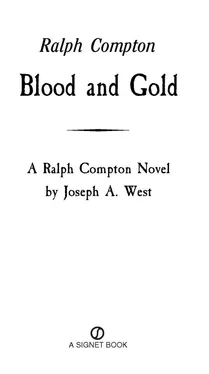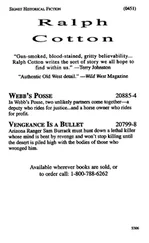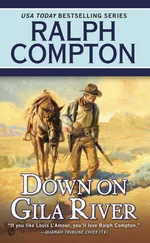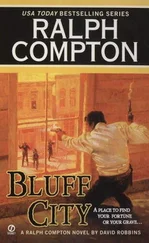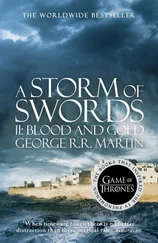She looked at Ned, the afternoon light harshly revealing the sunken planes of his unshaven cheeks and the dark circles under his sagging eyes.
“Pa,” she asked, “are you all right?”
The man nodded. “I just need to rest for a while.”
I swung down from the saddle and followed Lila and her pa to the wagon. Then I ground tied the black and slid the rifle from the boot.
“Boy, you keep watch behind us,” Wingo yelled. “I don’t want them Apaches coming at us across the damned creek.”
“They got Hank,” I said. I was telling Wingo something he already knew, but I was determined to leave the outlaw at least that three-word epitaph.
“The hell with him,” Wingo said, leaving him quite another.
The big gunman seemed to have forgotten about killing me, at least for now. Judging by the tenseness in his jaw and the way his knuckles showed white on the stock of his rifle, I figured the Apaches were his more urgent concern.
I took up a position near the creekbank, keeping the cottonwood to my left, and glanced around. The ashes of a fire lay in a circle near the bank and a battered coffeepot and a man’s flat-crowned hat were half-hidden in the grass.
It looked like the teamster who had driven this wagon had been attacked by Apaches only a couple of days before. I had no doubt they’d killed the man, but a scattering of shiny brass cartridge cases around the wagon showed where he’d made a good fight of it.
Just the previous spring, having all the confidence of the young, I figured that life was forever. But now, as the hours ticked slowly toward late afternoon, I had the uneasy feeling that maybe I wasn’t as immortal as I’d thought.
Unbidden, the thought came into my mind: Dusty, if Wingo doesn’t get you, the Apaches will.
I realized that I was in one hell of a fix and that realization brought me no comfort.
Over by the wagon, Wingo yelled at Lila: “Girl, see if you can find some wood or maybe some dry cow chips. We’re going to need coffee.”
“Lafe, you think that’s wise?” Ezra asked, his face strained, thin mouth pinched. “I mean the smoke.”
Wingo slowly shook his head, acting like he was feeling more sorrow than anger. “Ezra,” he said, real slow, “don’t you think the Apaches already know exactly where we are?”
A dawning realization crossed the man’s face and he gulped. “Yeah, you’re right. I guess they do.” Ezra’s eyes scanned the empty land around him. “I’m jumpy, is all. It’s this damned waiting that’s getting to me.”
“Me too,” Wingo said, his tongue running over his cracked lips. “It’s like I keep hearing footsteps.”
Although Lafe Wingo and Ezra Owens were experienced fighting men and possessed courage of a sort, theirs was the kind of bravery suited to short, explosive moments of action, the now-you-see-it, now-you-don’t daring of the typical frontier gunman.
This kind of taut waiting, while a man chewed on his heart and his belly was all balled up in a knot, required a quieter, more enduring courage that neither Ezra nor Wingo seemed to possess.
Did I?
I couldn’t even guess. I knew I was scared, so only time and events would provide the answer.
A long-handled shovel lay near the wagon and I used it to dig myself a shallow rifle pit. Then Wingo and Owens took their cue from me and did the same.
The three of us were as prepared as we were ever going to be, and the next move was up to the Apaches.
The day was shading into a cool, blue-shadowed twilight under a burnished sky the color of Black Hills gold when the warriors attacked. They came at us from two directions, one party of eight men charging directly toward me, intent on crossing the creek, the others concentrating on Wingo and Ezra.
Ignoring what was going on behind me, I fixed my attention on the task at hand. I fired at the Apache in the lead. Too fast. A clean miss. Taking a deep breath, I forced myself to slow down and fired at the man again. Another miss. The Apaches were closer now, riding hell-for-leather.
I got up on one knee, levered a round into the chamber, fired, and a man went down. I fired again. Another hit, though this warrior just swung out of the charge, blood staining the front of his shirt, and loped back in the direction he’d come.
Behind me I heard the constant crash of rifles as Wingo and Ezra fired. I jumped out of the trench and gave ground, bullets kicking up dust at my feet. The Apaches reached the creek and began to mill around, bunching together as they slowed their ponies to make the steep descent into the sandy streambed. I threw down the Winchester, shucked my Colt and hammered three fast shots into the clustered horsemen.
Two men went down, one of them screaming, and I emptied the Colt into the rest, as far as I could tell, scoring no other hits.
But it was enough.
No Indians, not even Apaches, will take casualties like that without pulling back to lick their wounds and talk things over. The warriors swung their horses around and loped away. I grabbed the Winchester, sighted on a trailing Apache and pulled the trigger. Click! I had hosed the rifle dry.
A bullet fired from somewhere well beyond the creek slammed into the dirt inches from my right bootheel as I fed shells into the Winchester. I looked around for a target, saw nothing and stepped over to the wagon.
The Apaches were gone, but three of them lay stretched out on the ground, short, wiry men in faded Spanish shirts and wide blue and red headbands.
I’d often spoken to old soldiers who’d fought in the War Between the States and as I stood and surveyed the carnage around me, I recollected one of them saying that the generals on both sides never did learn the folly of attacking entrenched infantry with light cavalry.
The Apaches had made that same mistake, and judging by the number of their dead, I’d say they’d paid dearly for it.
Wingo and Ezra had killed three, and I had downed three and wounded at least one other. The Apaches, always few in number, could ill afford a butcher’s bill of that magnitude.
I stepped past Wingo and Ezra, their faces streaked black with powder smoke, and went to Lila who was huddled behind the wagon, her pa’s head in her arms.
“Was he hit?” I asked, kneeling beside her.
Ned looked at me and managed a weak smile. “A bullet burned across the back of my head,” he said. He reached behind him, probing for the wound and when his hand appeared again it was bloody.
Lila rose to her feet. “Pa, I’ll get some water from the creek and bathe your head.”
“Better let me do that, Lila,” I said. “There are dead men over there.”
The girl nodded gratefully, but as I turned to leave, she stopped me and threw herself into my arms. “Dusty,” she whispered, “thank God you’re all right.”
I tilted up her chin with a forefinger and her lips parted, her eyes suddenly hungry. I kissed her then, hard and long, and when my lips finally left hers I said: “And I’m glad you’re all right too.” Then with a husky voice, and battling to understand my feelings for her, I added: “I better get that water.”
As I walked past Wingo, the man’s eyes followed me, a burning, barely subdued rage flushing his face.
The gunman wanted Lila, and he’d kill to get her. But I was prepared to fight to keep her, so as I filled my canteen from the creek, I figured that at least for right now, things were pretty much balanced out on that score.
I handed Lila the canteen and stepped beside Wingo and Owens.
“Shouldn’t we ride on out of here, Lafe?” Ezra was asking. “Seems to me we whipped them real good.”
Wingo nodded. “We whipped them all right, but they might be back. We stay right where we are until sunup. If we leave now and they catch us out in the open, we’re dead men.”
Читать дальше
